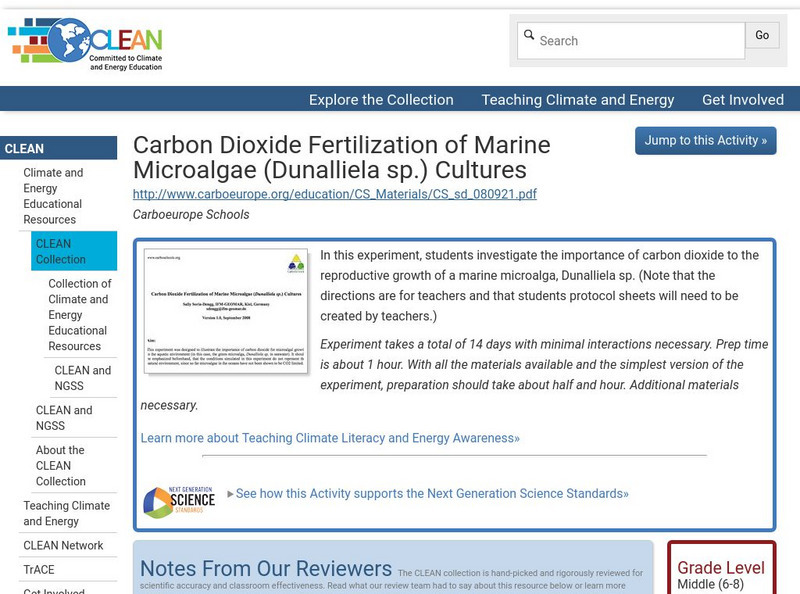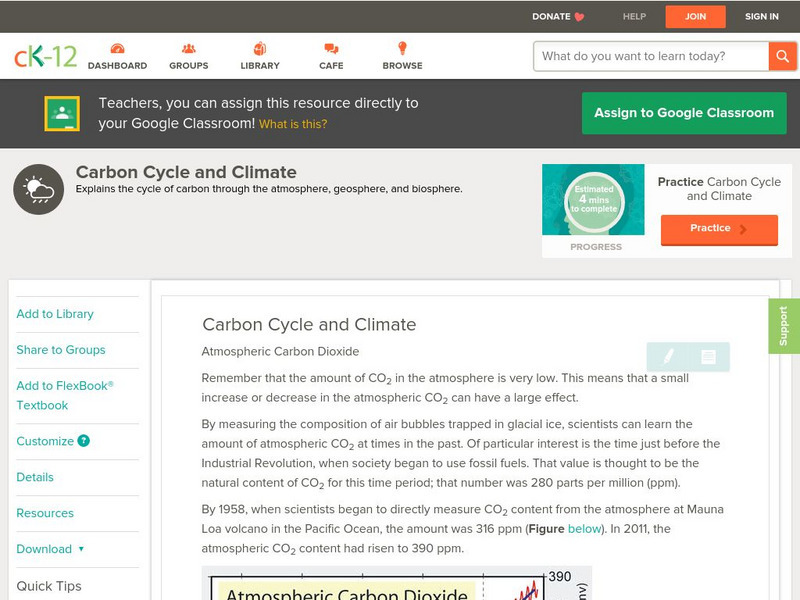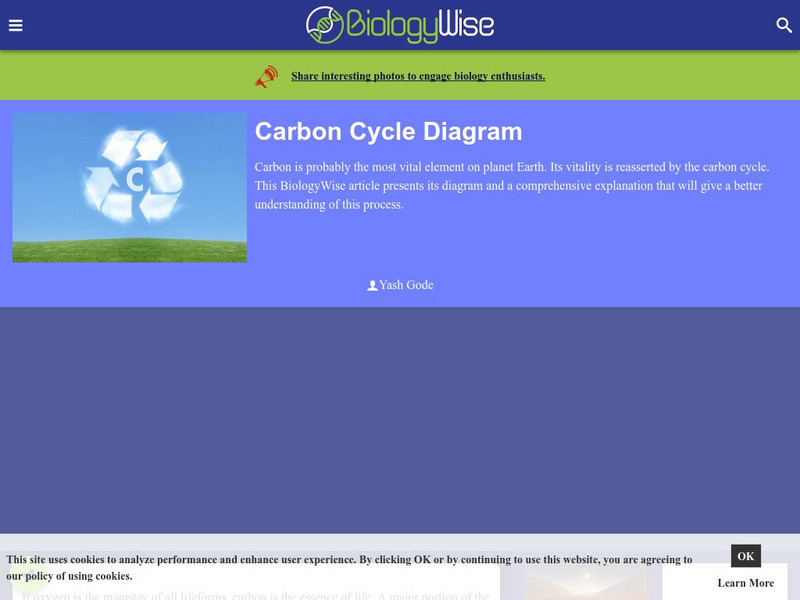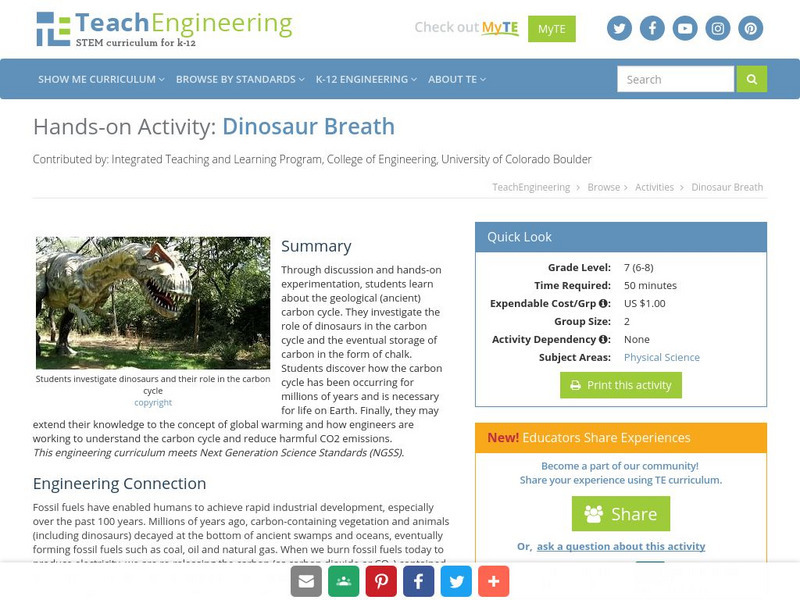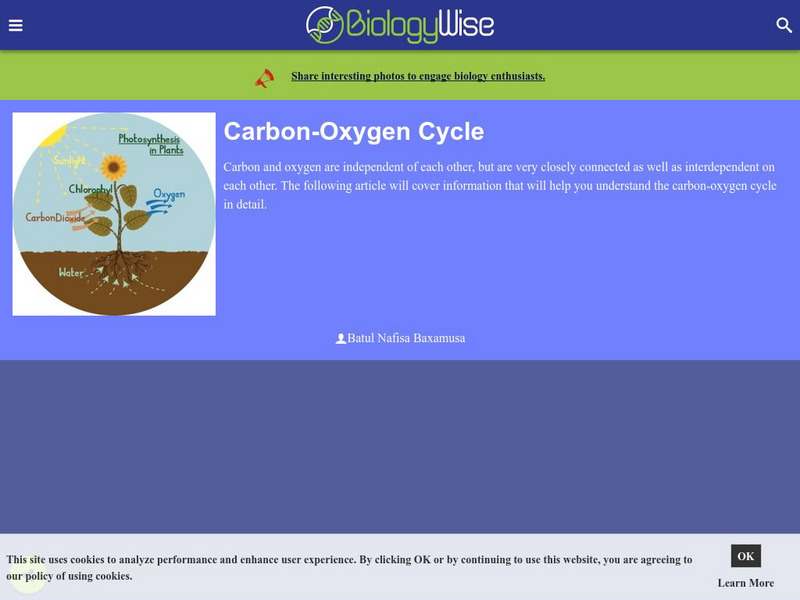University Corporation for Atmospheric Research
Ucar: The Carbon Cycle
A comprehensive introduction to the carbon cycle. The cycle of atoms between living and non-living things is known as a biogeochemical cycle. The most common of these are the carbon and nitrogen cycles.
Annenberg Foundation
Annenberg Learner: The Habitable Planet: Carbon Lab
An interactive lab simulation demonstrates the effects of increased carbon in the atmosphere and how that increase contributes to climate change. A data table for student records is available for download.
Climate Literacy
Clean: Carbon Dioxide Sources and Sinks
In this lab activity, students use a chemical indicator (bromothymol blue) to detect the presence of carbon dioxide in animal and plant respiration and in the burning of fossil fuels and its absence in the products of plant...
Climate Literacy
Clean: Carbon Dioxide Fertilization of Marine Microalgae Cultures
In this experiment, students investigate the importance of carbon dioxide to the reproductive growth of a marine microalga, Dunalliela sp.
Nature Research
Nature Education: Energy Economics in Ecosystems
This article discusses how plants and microorganisms, until recently, have mostly controlled how much carbon dioxide is released into an ecosystem, and explains how this process works. Humans' burning of fossil fuels has upset the...
NASA
Nasa: Carbon: Where Does It All Go?
At this site from NASA you can understand how phytoplankton help the carbon dioxide levels between the oceans and the air stay in balance.
CK-12 Foundation
Ck 12: Life Science: Carbon Cycle
[Free Registration/Login may be required to access all resource tools.] Carbon is one of the most common elements found in living organisms. Chains of carbon molecules form the backbones of many molecules, such as carbohydrates,...
Mocomi & Anibrain Digital Technologies
Mocomi: Carbon Cycle
The carbon cycle is one of the most important cycles. It is the biogeochemical cycle by which carbon is exchanged among the biosphere, pedosphere, geosphere, hydrosphere, and atmosphere of the Earth. This cycle is important because it...
CK-12 Foundation
Ck 12: Biology: Carbon Cycle
Learn about the carbon cycle.[Free Registration/Login may be required to access all resource tools.]
Scholastic
Scholastic: Study Jams! Science: Ecosystems: Carbon Cycle
An engaging interactive enhancing studies of the carbon cycle. Check out a short video, sing karaoke about chlorophyll, take a quiz, and review vocabulary words.
CK-12 Foundation
Ck 12: Earth Science: Carbon Cycle and Climate
[Free Registration/Login may be required to access all resource tools.] How carbon circulates throughout the environment.
CK-12 Foundation
Ck 12: Earth Science: Carbon Cycle and Climate
[Free Registration/Login may be required to access all resource tools.] How carbon circulates throughout the environment.
CK-12 Foundation
Ck 12: Life Science: 12.22 Carbon Cycle
Understand the role that the carbon cycle plays in the ecosystem.
Ducksters
Ducksters: Science for Kids: Oxygen Cycle
Kids learn about the oxygen cycle and how this nutrient travels through the ecosystem to sustain life on Earth.
Ducksters
Ducksters: Science for Kids: Carbon Cycle
Kids learn about the carbon cycle and how this nutrient travels through the ecosystem to sustain life on Earth.
BiologyWise
Biology Wise: Carbon Cycle Diagram
Explains what the carbon cycle is and the basic steps in the cycle.
TeachEngineering
Teach Engineering: Dinosaur Breath
Through discussion and hands-on experimentation, students learn about the geological (ancient) carbon cycle. They investigate the role of dinosaurs in the carbon cycle and the eventual storage of carbon in the form of chalk. Students...
BioEd Online
Bio Ed Online: Fossil Fuels and the Carbon Cycle
In the following lesson students learn how geologists locate fossil fuels by using a straw to extract "core samples" from a model that has different layers. Student sheets are provided in English and in Spanish.
National Geographic
National Geographic: Sources, Sinks, and Feedbacks
Students will learn about how the Earth's carbon cycle works, as they examine the relationship between levels of carbon dioxide and water vapor in the atmosphere and the temperature of the ocean's surface. Includes online student...
TeachEngineering
Teach Engineering: Biorecycling: Using Nature to Make Resources From Waste
By studying key processes in the carbon cycle, such as photosynthesis, composting, and anaerobic digestion, students learn how nature and engineers biorecycle carbon.
PBS
Pbs: Nova: Illuminating Photosynthesis
To understand the process of photosynthesis, follow the hydrogen, carbon, and oxygen atoms as they travel between the air, the plant, and the soil.
BiologyWise
Biology Wise: Carbon Oxygen Cycle
The fours stages of the carbon-oxygen cycle are described - photosynthesis, respiration, combustion, and decomposition.
BiologyWise
Biology Wise: An Easy Explanation of the Carbon Cycle for Kids
The importance of the carbon cycle, how it works, the sources of carbon, and the steps in the carbon cycle are explained here.
BiologyWise
Biology Wise: A Brief Guide to the Steps of the Carbon Cycle
Outlines the steps for the movement of carbon along the carbon cycle through photosynthesis, food chains, being dissolved into the ocean, the decomposition of organisms, fossil fuel formation, industrial use of fossil fuels, carbon...
Other popular searches
- Oxygen Carbon Dioxide Cycle
- Oxygen, Carbon Dioxide Cycle
- Carbon Oxygen Cycle Diagram
- Oxygen Carbon Dioxide Cycle
- Oxygen Carbon Dioxide Cycle
- Oxygen Carbon Dioxide Cycle
- Oxygen Carbon Nitrogen Cycles
- Biology Carbon Oxygen Cycle




